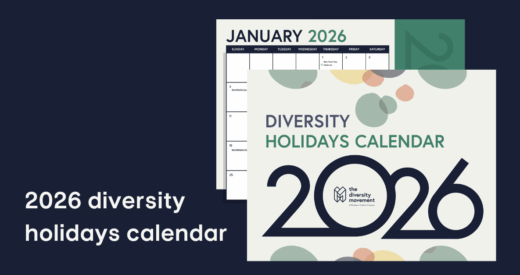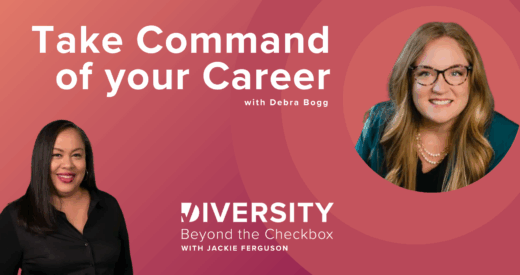Jason Gillikin: You're listening to the Diversity Beyond the Checkbox podcast, brought to you by The Diversity Movement. I'm Jason Gillikin, executive producer of this show. And today we're going to do something different. On August 27th, 2020 Jackie Ferguson host of this podcast and head of content at The Diversity Movement hosted a virtual privilege walk. And we wanted to share some of that with you today because it has such an impact on the almost 150 attendees and certainly on the panelists as well. I'll let Jackie explain what a privilege walk is in just a second, but for the purposes of this podcast, just know that this is a small sample of the experience from that day.
Jackie asked 41 questions based on privilege and here we're sharing just a few of those. And then after the walk for panelists, including myself, Came on to talk about our scores and our experiences with privilege throughout our lives. So if you're listening to this and you'd like to schedule a virtual walk for your company or your team, be sure to contact the diversity movement.com.
Here's Jackie.
Jackie Ferguson: Hello everyone. And thank you for participating in a virtual privilege walk. Before we jump into what a privilege walk is, let's talk about the concept of privilege. Oftentimes people associate privilege, right? One race or gender, or with affluence. However privilege is reflected in many situations, many lifestyles and among many demographics.
For example, how many of you, you had at least one supportive, loving parent that advantage made life easier for you. You didn't have to fight to discover it personal self worth because you had someone cheering for you and showing you love. Even during the challenging times and privileges often have nothing to do with how hard you personally work. Privilege isn't necessary a reflection of you as much as it is the perception and assumption to others about who you are and what you're capable of. Do you feel safe, sleeping in your own bed, going for a jog, bird watching? What happens when a police officer stops you for a broken tail light? Clearly not everyone has equal privilege.
Thankfully, I think more people are leaning in on the acknowledgement of privilege. And right now we need people, all people to use their privilege, their access, their influence, their platforms, and their resources to make systemic change across our country. And I hope this inspires you to feel empowered with your privilege to do so.
So now that we're level set on privilege, let's talk about the privilege walk. This is a little different because traditionally these are done in person. The group stands side by side and take steps forward or steps back based on the question of privilege or challenge. The purpose is to be mindful and present with your individual level of privilege.
Now some people find them to be very enlightening and some people don't care for privilege walks because of a perceived embarrassment or conviction with having too much privilege or too many challenges. But I want to offer an alternate perspective. If you discover higher levels of privilege in this exercise, you're empowered to use your advantages to advocate for equity and inclusion across your organizations and communities.
Your voice is so important in allyship. If you find that you've had to overcome significant challenges in your life, you're empowered to inspire others and to be empathetic leaders and culture drivers. So let's talk about this virtual privilege walk, I'll read a series of 41 statements. We'll all start with a score of zero.
With each statement, I'll ask you to add one. If a particular privilege applies to you remember adding one doesn't mean better than it's simply means you had a specific privilege and not adding one doesn't mean less than it simply means you had a specific challenge. Okay. Let's begin. If you are right handed, add one.
If you never had your utilities cut for nonpayment while growing up, add one. If there was never substance abuse in your household, add one. If you were never told by your parents that you'd have to work harder than everyone else to get ahead because of your race, ethnicity, gender sexual orientation, or disability, add one.
Please take a moment to calculate your privilege number. And if you'll share those numbers in the chat at the bottom of your screen, I'd like to see what some of those are. Wow. There's a range. There's a broad range from high thirties to nineteens, eighteens, eleven. Amazing. Thank you for sharing those.
One of the arguments of privilege is I worked hard for what I have, and I'm not disputing that. In fact, I respect it. However, if you think back over the statements, all 41 privileges related to something that was outside your personal control. So when people say we all have access to the American dream, privilege has us starting our race to success at different points.
We don't all begin at the same starting line. Remember that you shouldn't feel bad about your privilege. You want to use that privilege and lean into that privilege so that you can benefit, provide access to others, provide them opportunities to others that don't have those same privileges. So we want to empower you to feel like you can make a difference with the privileges that you're providing.
So now I'd like to invite our guests to join me for a quick discussion. So if you will unmute yourself, Thank you so much for being here today. I'm so excited about our panelists and these four are amazing leaders and also friends. Kendrall Felder is the global head of centralized services for IT at the multinational tech conglomerate, Cisco. He leads over 600 people in his department.
Carolyn Morris is the CEO of Orange Soul, a consulting firm that empowers individuals to create and maintain healthy relationships, boundaries and confidence. John Samuel is the chief innovation architect and LCI Tech. One of the largest employers of professionals who are blind. In the U S LCI tech is a leader in digital accessibility and provides consulting for digital inclusion for people with disabilities.
And Jason Gillikin is the CEO of Earfluence, a media production company that amplifies brand exposure and build the PR engine for its clients and influence produces podcasts, including The Diversity Movement's, Diversity: Beyond the Checkbox podcast. So what were their paths to success? So let's ask some questions and find out.
What did you realize for my panelists about the concept of privilege from participating in this walk and whoever would like to go first, please start.
Jason Gillikin: Yeah. So, Jackie, you and I, you mentioned we've been on this, privilege journey for the past year, year and a half or so. Ever since, you came up with the concept of the Diversity: Beyond the Checkbox podcast, and we've had a lot of diversity types of conversations around this.
And I wasn't quite aware of my privilege, you know, before that. So this walk is part of the journey that I've been on for the past year, year and a half or so in realizing that, you know, I have been privileged. I haven't had to worry about the cops all over so many times for speeding and I never, ever.
I don't have to worry about that. It's true. I mean, Carolynn, you're laughing, but like, it's true. Like I had a very led foot and I never had to be concerned. I never even thought about it. Also, I never had to have the conversation with my parents about, you need to be concerned about the blue lights.
So this, I knew my score would be pretty high and it was, it was 36. And it's just part of this journey that I've been on for the past year, year and a half.
Jackie Ferguson: Thanks Jason for sharing that.
Carolynn Morris: My number was 33 and as we were going through these different questions, they was just, I didn't even realize.
That having two parents in the home or a parent in the home was a privilege. I just took it as like, this is normal life. This is what is quote unquote normal for me. And I didn't even realize that or going to school and having accessibility of just going wherever I, wherever I feel like I want to, and having encouragement of going to college and getting my higher education.
That was a huge push. Not only for my parents, but my grandparents and. Uh, my journey is more through this diversity privilege walk. It made me realize that my life experience is not the same as everybody else's. So often we tend to say like, well, this is my life experience and I'm projecting it on everybody else's like where it was like seeing an unseen disability that was really profound to me because how often do we walk past someone and they may be struggling with depression, or they may be struggling with anxiety. And it's like, well, I don't have depression or anxiety, so they don't have depression or anxiety.
And it was so helpful for me to check myself is like, no, no, no, no. Just because it's my reality doesn't mean it's theirs. I need to take a step back and ask questions of how are you really doing today? And I was like, Oh, you know what? My depression is really kicking me today. Like, it is, it's a rough day because like those seen and unseen experiences are very real and it turns out, it is a privilege. And I didn't, I didn't realize that.
Kendrall Felder: Absolutely. Hey Jackie, can I jump in? I'd like to share a couple of different perspectives. Uh, the first for me, and to be transparent, my score was 13, but, but to your point about it being, not less than, or more than even with my score, being what it was, I still feel incredibly blessed.
And especially about the privilege of having a parent in the home. I had a wonderful mother who cared a lot about my wellbeing and that. Not everyone has that really struck a chord for me. And so that, that privilege in itself, I could have had one out of 41, but having that one was, was very important.
But furthermore, it dawned on me that as an individual that 41 questions is as a subset of what privilege really looks like when you think about it more broadly. And so why my score here was 13, I've come to realize that as an adult, at least I have a lot more privileged than I realized, and I try to take that approach because that the daunting realities that you all talk about, where you get followed around stores, or even when you get the customer service, they treat you as if you can't afford what you're asking for. That that's the reality. But, but to the, I think the point of this exercise. I'd like to take this experience and pass my privilege along to others, because there's so much more for people to benefit who have less than in the world, or don't have the same opportunities that we do.
So thank you for that. It was really revealing to me as we went through the exercise.
John Samuel: Yeah, no, I mean, this was really just a, it was a really unique experience for me because as I was going through it, I answered the questions, uh, as myself today, somebody who is blind. Um, and so when I got my score, it was 28, but when I look back at it before I lost my sight, when I was 19, 20 years old and 2000, my score was 33.
So as a child growing up with more privilege, I think that just. It, it, it made me much more, um, I, you know how thankful I am as a child to have that privilege. Cause I think at that those vulnerable ages and those developmental ages to have that privilege, it gave me confidence, which as I did start to lose my sight and maybe my privilege did go down a bit.
I was, I still feel that I'm at that 33. Right. And that's helped me throughout my career. So as people talked about, you know, you know what, you know, when they described the panelists here, I think my. My confidence comes from having this parents just like, you know, mentioned having that parent and that, that love and support of the child.
I think that was instrumental for me.
Jackie Ferguson: Absolutely. Thank you, John. So we're going to dig in a little bit more
Jason Gillikin: And we did dig a little bit more on that virtual privilege walk, Kendrall, John, Carolyn, and I shared our experiences with police, with our workplaces and we've even got to generational privilege. And if our kids are more or less privileged than we were such a fascinating conversation, I felt honored just to be a part of it.
As I mentioned at the top of the show. If you're interested in scheduling a virtual privilege walk for your company or team, visit thediversitymovement.com. And thanks for everyone who participated in this, especially Jackie Ferguson, Kaela Kovach-Galton, Carolynn Morris, Kendrall Felder, and John Samuel.
This episode was edited and produced by Earfluence. Thanks for listening everyone, and we'll see you next time on the Diversity: Beyond the Checkbox podcast.
On August 27th, 2020, Jackie Ferguson, host of this podcast and TDM Head of Content & Programming, hosted a virtual privilege walk which had a huge impact on the over 150 attendees and the panelists as well.
On this episode, Jackie explains what a privilege walk is and we share a small sample of the experience from that day. Briefly, Jackie asked 41 questions based on privilege, and here we’re sharing just a few of those. After the walk, 4 panelists came on to talk about their privilege numbers and experiences with privilege throughout their lives. So if you’re listening to this, and you’d like to schedule a virtual walk for your company or team, be sure to contact us.
Find this podcast on Spotify and Apple Podcasts.
Find Jackie on Linkedin.





